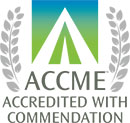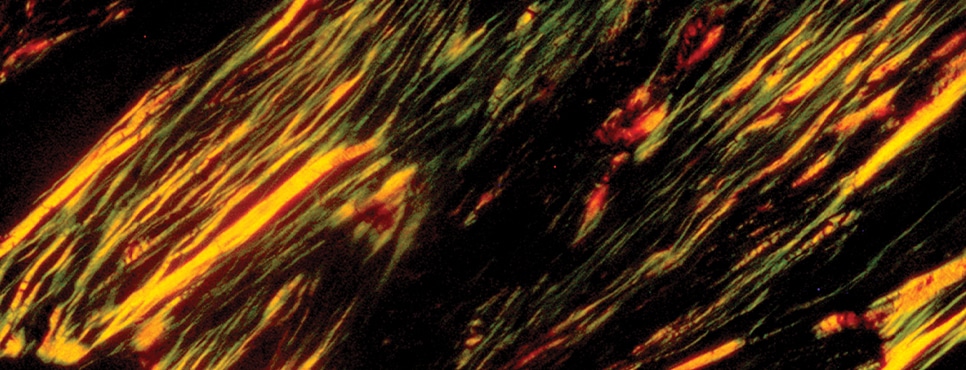Continuing Medical Education
ACCREDITATION STATEMENT

The American Association for Cancer Research (AACR) is accredited by the Accreditation Council for Continuing Medical Education (ACCME) to provide continuing medical education activities for physicians.
CREDIT DESIGNATION STATEMENT
The AACR has designated this live activity for a maximum of 18.5 AMA PRA Category 1 Credit(s)™. Physicians should only claim credit commensurate with the extent of their participation in the activity.
Credit certification for individual sessions may vary, dependent upon compliance with the ACCME Accreditation Criteria. The final number of credits may vary from the maximum number indicated above.
CLAIMING CME CREDIT
CME credit is available for in-person attendance for the designated sessions. On-demand presentations are not eligible for CME.
Physicians and other health care professionals seeking AMA PRA Category 1 Credit(s)™ for this live continuing medical education activity must complete the online CME Request for Credit Survey by October 28, 2022. Certificates will only be issued to those who complete the survey. Your CME certificate will be sent to you via email after the completion of the activity.

Successful completion of this CME activity, which includes participation in the evaluation component, enables the participant to earn up to 18.5 Medical Knowledge MOC in the American Board of Internal Medicine’s (ABIM) Maintenance of Certification (MOC) program. Participants will earn MOC points equivalent to the amount of CME credits claimed for the activity. It is the CME activity provider’s responsibility to submit participant completion information to ACCME for the purpose of granting ABIM MOC credit.
To receive ABIM MOC, participants must request MOC in the CME Request for Credit Survey and complete all questions. Once these steps are completed, AACR will submit your completion information via the ACCME’s Program and Activity Reporting System for the purpose of granting MOC points.
STATEMENT OF EDUCATIONAL NEED, TARGET AUDIENCE, AND LEARNING OBJECTIVES
According to the U.S. National Cancer Institute, pancreatic cancer will account for approximately 49,830 deaths in 2022. Pancreatic cancer will account for just 3.2% of all new cancer cases but will account for 8.2% of all cancer deaths. Despite advances in recent years, the 5-year survival rate is only at 11.5% – making pancreatic cancer one of the most lethal malignant neoplasms.
Because patients seldom exhibit symptoms until an advanced stage of the disease, early detection and diagnosis are a primary area of concern in pancreatic cancer research.2 Detection at more advanced stages also results in fewer opportunities for radical resection and pancreatic cancers are infamous for having limited response to chemotherapy, radiotherapy, and resistance to immune therapy3. The dense stroma surrounding pancreatic tumoral cells is also thought to create a mechanical barrier that contributes to treatment resistance.
Many factors contribute to poor survival rates of pancreatic cancer1, including the difficulty in diagnosing patients early and poor treatment response. Compounding these issues are the growing understanding of how inequal access to care4-5 intensifies disparate outcomes in pancreatic cancer. There is a growing need for pancreatic cancer researchers and clinical care providers to understand the many underlying issues contributing to pancreatic cancer so that better and more equitable care can be provided.
This conference will meet this need for by providing a venue to synthesize concepts in basic research into clinical applications for pancreatic cancer.
After participating in this CME activity, physicians should be able to:
- Identify current disparities and challenges for health equity as it relates to pancreatic cancer.
- Explain the interplay between basic science discoveries and the development of clinical trials for pancreatic cancer.
- Assess immunological and tumor microenvironmental contributions towards pancreatic cancer initiation, progression and treatment response.
- Articulate the role of tumor metabolism and microbiome in influencing pancreatic cancer disease states.
- Evaluate recent clinical advances made in treating pancreatic cancer.
- Compare how tumor plasticity contributes to treatment resistance.
DISCLOSURE STATEMENT
It is the policy of the AACR that the information presented at AACR CME activities will be unbiased and based on scientific evidence. To help participants make judgments about the presence of bias, AACR will provide information that Scientific Program Committee members and speakers have disclosed all financial relationships they have with ineligible companies whose primary business is producing, marketing, selling, re-selling, or distributing healthcare products or services used by or on patients. All of the relevant financial relationships for these individuals have been mitigated.
ACKNOWLEDGMENT OF FINANCIAL OR OTHER SUPPORT
The AACR gratefully acknowledges the following commercial supporters:
PROFESSIONAL EDUCATION GRANTS
- AstraZeneca
- Novocure
QUESTIONS ABOUT CME?
Please read our frequently asked questions. If you still have questions, please contact the Office of CME at (215) 440-9300 or [email protected].
